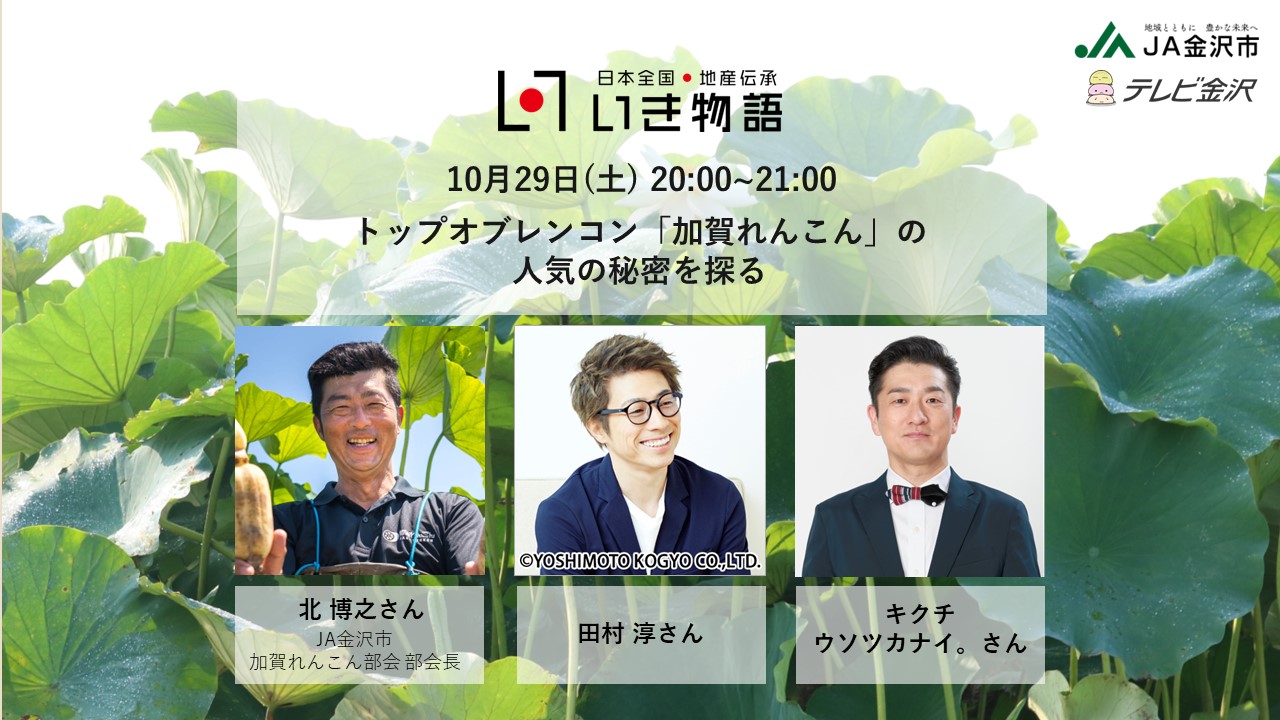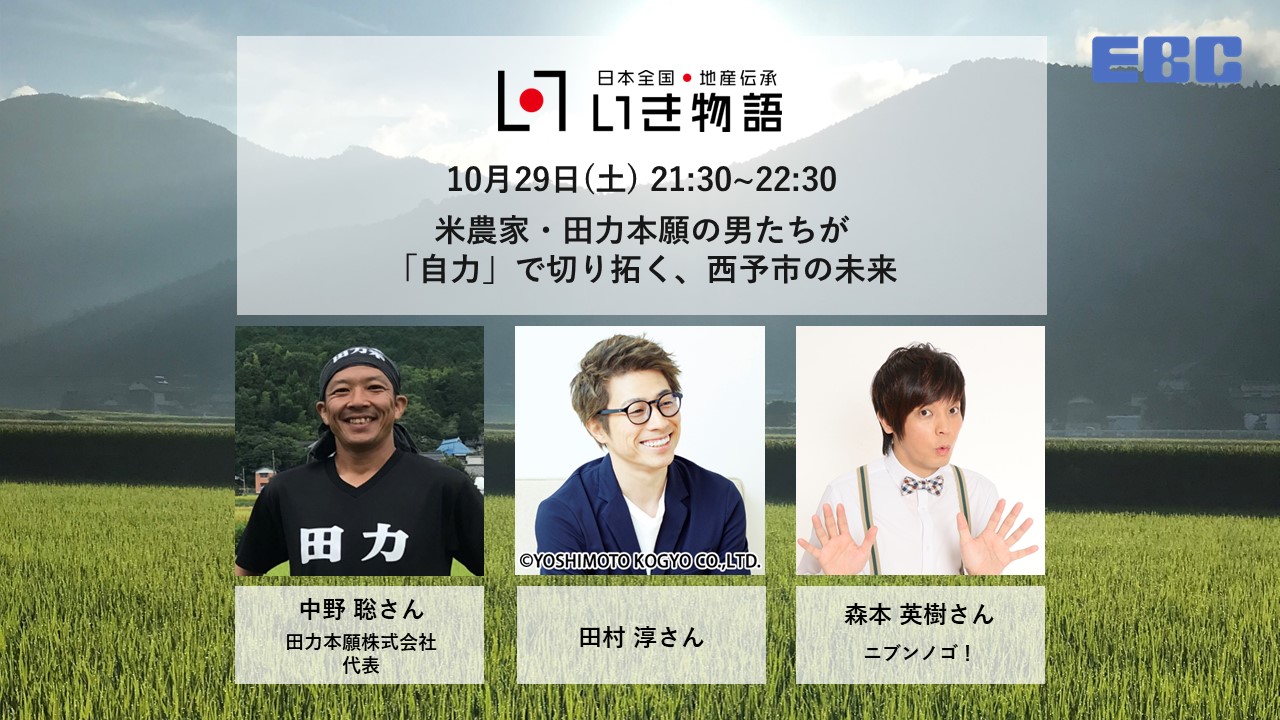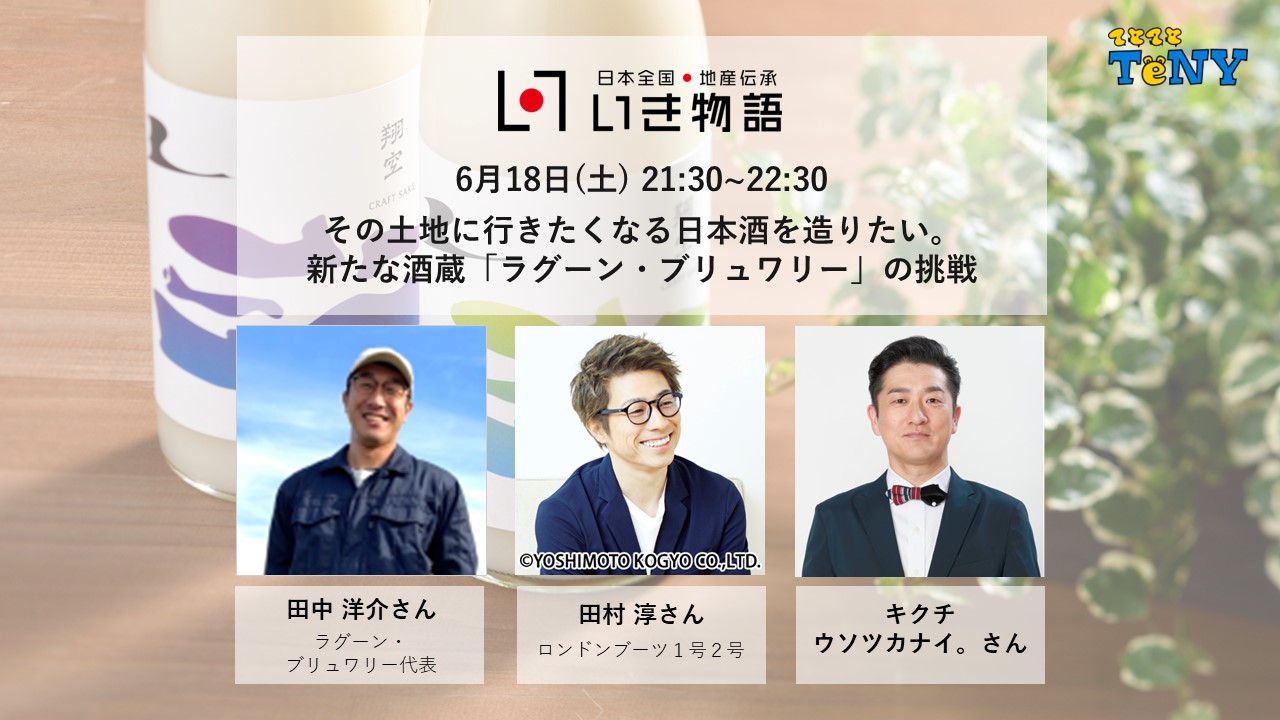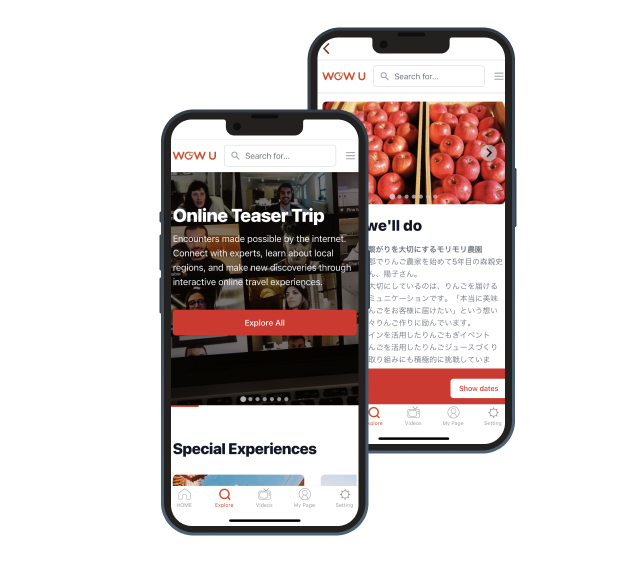Miyazaki Has More Than Just Mangoes! Rare and Fascinating Domestic Avocados
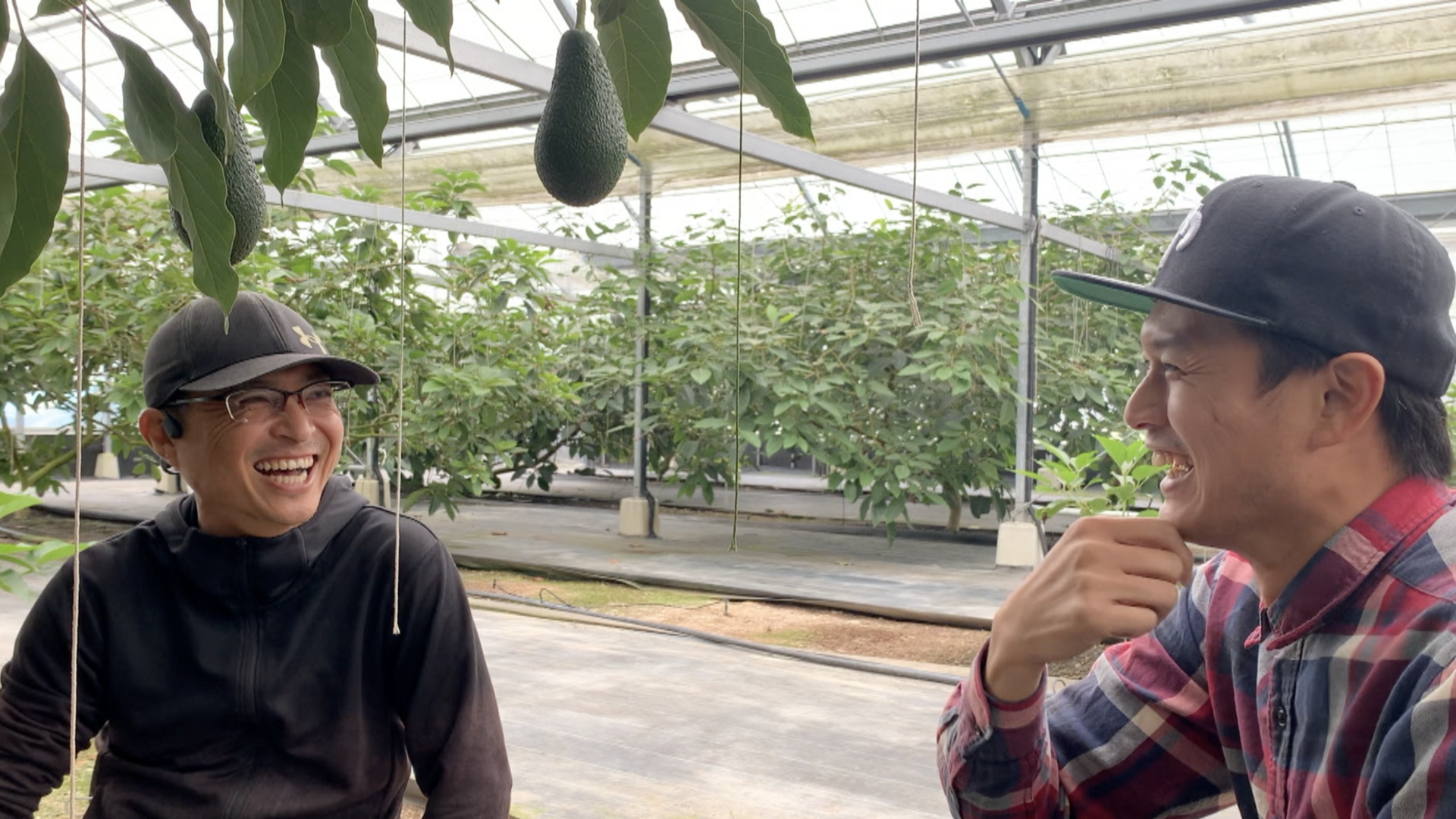
Many foods and traditional crafts created with extraordinary enthusiasm and commitment exist in the rural areas of Japan. These products are, of course, of the highest quality, but behind them is also the conviction of the manufacturers and the stories that have resulted in their present state.
Ikimonogatari: All Japan Local Productions and Folklore events will introduce traditional crafts and specialty products that can only be found in local regions and convey the charms of those rural areas by sending broadcasters directly to the source to dig deep into the activities of the people there.
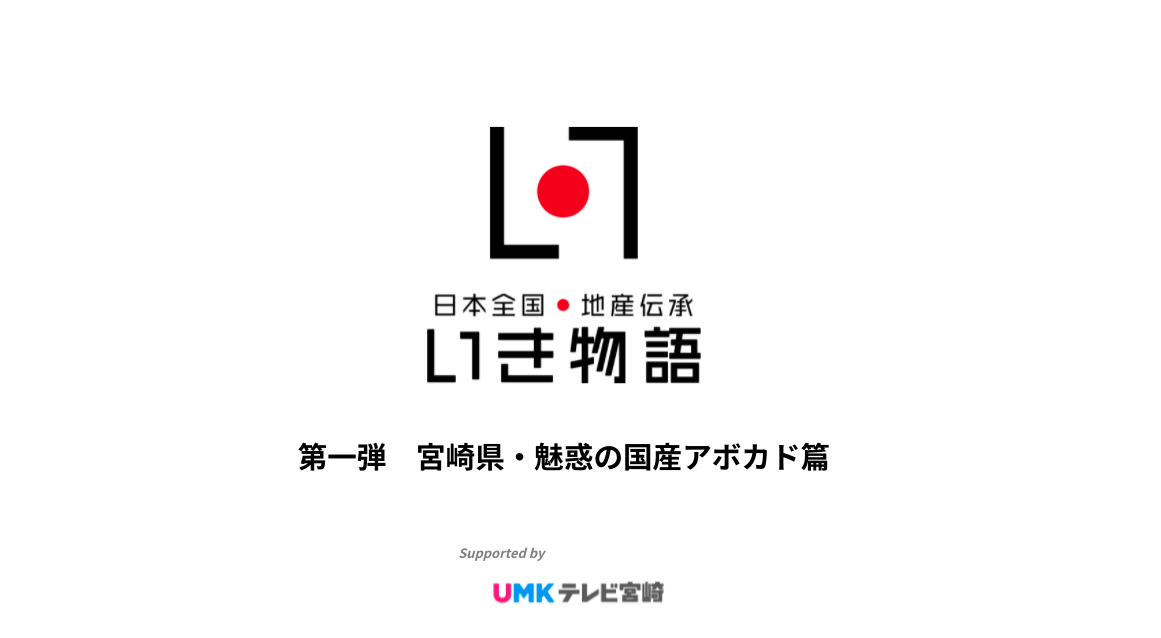
The Featured Guest for This Event: Mr. Yoichi Yokoyama of Yokoyama Fruit Farm
Mr. Yokoyama has cultivated over 50 different varieties of avocado, and he has extensive knowledge about their unique characteristics. Currently, almost 100% of avocados that are distributed domestically are imported, but he is continuing to research methods of how to increase the nationwide distribution of domestically produced avocados to 1%.
Special guests: Atsushi Tamura of comedy duo London Boots Ichi-go Ni-go, Manabu Hattori of Yao Kyushu, and announcer Kana Takeda of UMK TV Miyazaki.
In Miyazaki Prefecture, where greenhouse agriculture is common, one particular orchard is taking on the unique challenge of cultivating domestic avocados. There are over 1,000 varieties of avocados in the world, but the ones that are distributed in Japan are almost completely of a variety called Hass. When thinking of avocados, many may have the impression that the peel is tough and turns black when ripe, but not all types of avocados share those characteristics.
During this event, Mr. Yokoyama, one of only a few farmers who cultivate many types of avocados, talked about the taste and appeal unique to avocados grown in Japan. Additionally, Manabu Hattori of Yao Kyushu, who is involved in the mail order sales of Kyushu vegetables and knows all about the produce in Miyazaki, introduced Mr. Yokoyama's avocados from his own viewpoint.
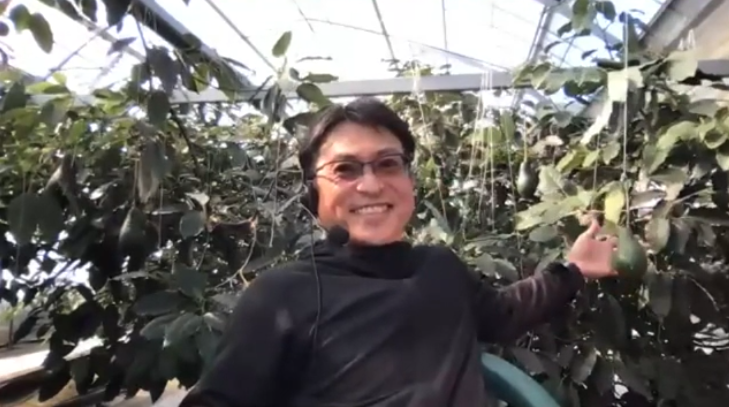
●Domestic Avocados Are Scarce! They Make Up Less than 1% Of the Nationwide Distribution
Takeda: Mr. Atsushi, did you know that there are only about ten manufacturers in the whole of Japan who grow avocados?
Tamura: Why are there so few?
Yokoyama: The technology for avocados hasn't been established yet. Their production has really just started.
Tamura: So, there are farmers who would like to grow them, but it's a trial-and-error process to figure out how.
Yokoyama: That's right.
Tamura: Why did you decide to take on that difficult of an endeavor?
Yokoyama: I love avocados, and I figured that if I was going to buy them, I might as well grow them myself.
Tamura: I've never thought like that. [laughs] Liking avocados so much you decide to just make them yourself. What did you grow originally?
Yokoyama: Primarily, I am a mango farmer.
Tamura: Is that so?
Takeda: A lot of avocado manufacturers don't focus on only avocados, but also grow other produce at the same time.
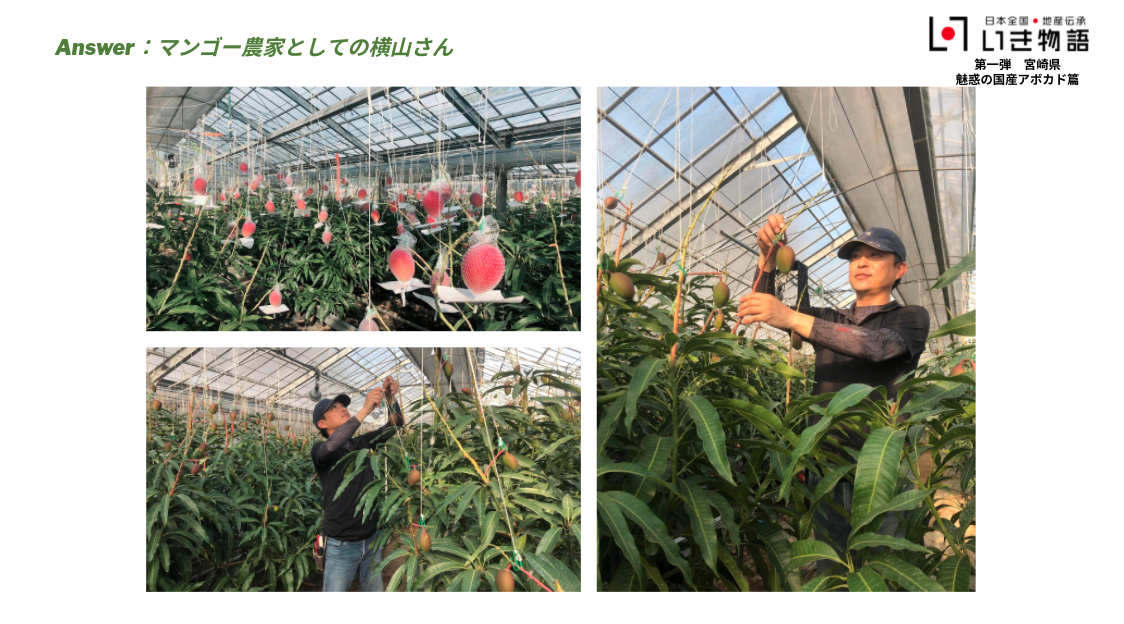
Tamura: There is a great demand for mangoes in Japan, isn't there? I think they're the king of fruits. Even though you're getting good results from mango production, why did you decide to take on the challenge of avocados when you don't know how they'll turn out? I guess you probably thought it would be faster to grow them yourself?
Yokoyama: The mangoes were started by my father. It wasn't me. I don't actually want to grow the same thing as my father. I figured, if I'm going to work in agriculture, I want to grow something that I like. That was avocados.
Tamura: But weren't there a lot of options to choose from? If avocados are difficult, why did you decide to take on that challenge?
Yokoyama: I didn't want to do what everyone else is doing. That's just my personality. There are difficulties, but I want to do everything myself from step one. Call it a pioneering spirit. That's a strong point, isn't it? [laughs]
Tamura: It's also like an adventure, isn't it?
Yokoyama: Yes, it's a great adventure.
Tamura: I see. So, you're the type of person who doesn't want to do the same things as your father, and you definitely don't want to do what other people are doing either.
Yokoyama: That's exactly what I mean.
Tamura: Did it go well right from the first year?
Yokoyama: It took two years for the first fruit to grow. I don't know if that's fast or slow though.
Tamura: If someone who got results with mangoes in their first year tried this and it still wasn't great by the second year, if it were me I think my heart would break. But you feel like if you're going to buy them, you might as well grow them.
Yokoyama: That's right.
Takeda: Mr. Yokoyama, how much do you like avocados?
Yokoyama: Even if I'm looking at them every day, it doesn't feel like work. I don't get tired at all. Not when I'm working with avocados.
Tamura: Do you get tired of mangoes?
Yokoyama: I get very tired of mangoes. [laughs]
Tamura: So, avocados are something you're trying yourself, while mangos are something that lots of people seek after, and there is a history of your father growing them, too. It must be the enthusiasm of making your own history that keeps you from getting tired of them.
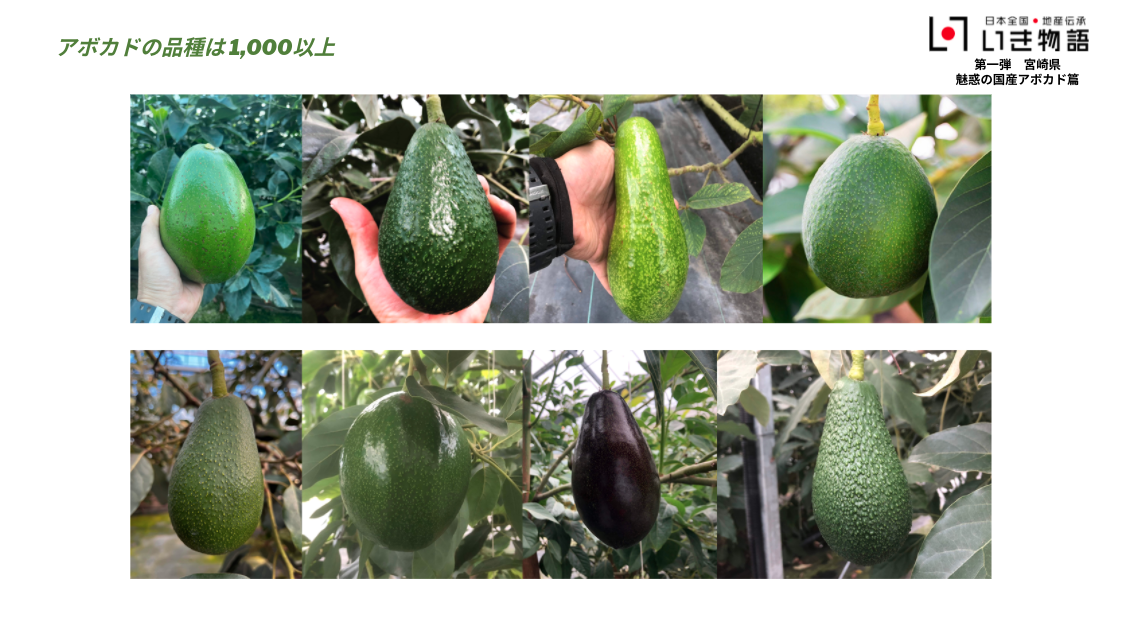
●Taking on the Challenge of Producing Many Varieties of Avocados
Tamura: Are there a lot of different kinds of avocados in these shapes?
Yokoyama: Yes, there are. Here, we have tried growing around 50 different varieties. The size, color, and shape of each of them are different.
Tamura: You tried out 50 different types?
Yokoyama: There are varieties we stopped cultivating, but yes.
Tamura: What type are the avocados we usually eat?
Yokoyama: That's a variety called Hass.
Takeda: The ones we normally eat, they're almost entirely this variety, aren't they?
Yokoyama: Yes.
Tamura: Even though there are over 1,000 varieties of avocados.
Yokoyama: It’s said that there are more than 1,000 varieties of avocado grown all over the world, but currently only one, or at most two, varieties are imported into Japan.
Tamura: Mr. Hattori, you take care of distribution at a place called Yao Kyushu. There still aren't many examples of Miyazaki avocados being shipped out to the rest of the country, are there? When Mr. Yokoyama said he was going to cultivate avocados, what did you think at first?
Hattori: We met about 9 years ago. I originally came to inspect the mangoes. I listened to him talk for about two hours, and then in the last five minutes he said he had something interesting to show me and invited me into the avocado testing greenhouse. They were still potted seedlings at that point, but he had a big smile on his face when he told me he was growing them. [laughs]
Tamura: Can you picture that smile even now?
Hattori: Yes, because he looked much happier about the avocados than when he had been explaining about the mangoes.
Tamura: Did Mr. Yokoyama's enthusiasm make you think you wanted to help him out?
Hattori: Yes, it did. We decided to work together and aim for the number one avocado farm in Japan.
Takeda: Mr. Hattori is the contractor who deals with the largest number of avocado varieties in Japan.
Takeda: There's a question from a listener: "Are all avocado seeds the same shape?"
Yokoyama: The seeds are also completely different. They're all right in the middle, but their size and shape are all different.
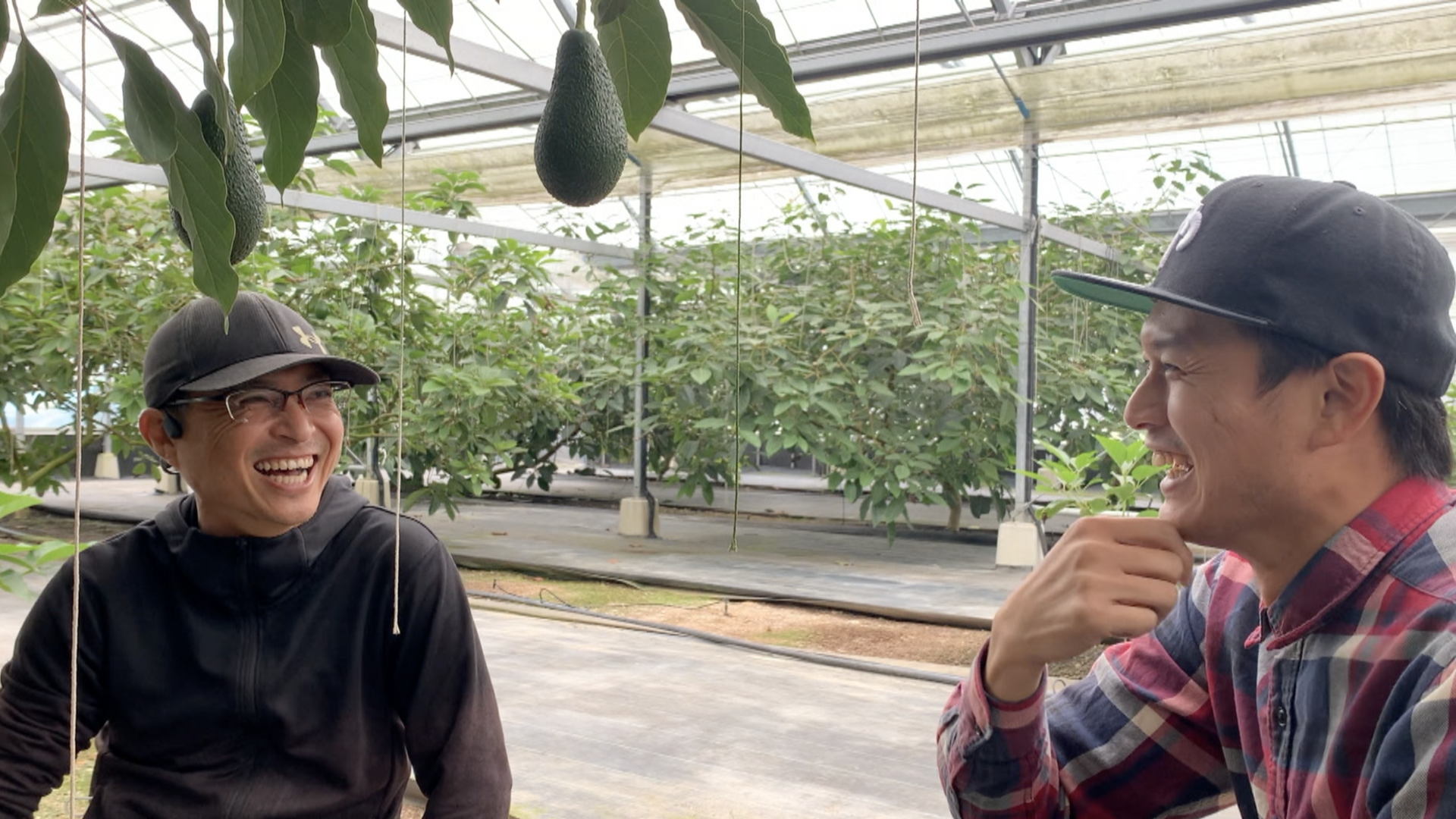
Tamura: Mr. Hattori, have you tasted all 1,000 types of avocado?
Hattori: No, I only handle the ones that Mr. Yokoyama grows. Until now, we've handled over 10 types of product. Every year 2-3 new varieties are tested, so I think that number will increase in the future.
Tamura: That's amazing. Mr. Yokoyama's inquisitive mind, I mean. He feels that there are still more things he's suited for and keeps testing them out.
Yokoyama: That's really it. I don't know which varieties are good, because we haven't done variety selection yet.
Tamura: In the meantime, there are some products with which you're satisfied though, right?
Yokoyama: Yes, there are. There are around five varieties that I think I can work with.
Tamura: There are over 1,000 of them, so you're still testing to see which avocados are best suited to Miyazaki's soil.
Yokoyama: Yes, that's right. Also, there aren't any seedlings. Now, in Japan, I don't think there are even 50 varieties of seedlings on the market.
Tamura: If that's the case, where do you get them?
Yokoyama: I purchase them on the internet, but really I'd like to physically go abroad.
Tamura: Is that so.... You can't go now because of COVID-19 though.
Yokoyama: Yes, there's also that.
Tamura: You seem like you'd immediately go to Mexico. [laughs]
Takeda: Within Japan, Miyazaki is a fairly warm place, so it's suited to growing avocados, isn't it?
Yokoyama: Avocados are primarily a tropical fruit. They can't be grown in Japan. If it snows, or if there's a frost, they'll wilt and die. That's why I cultivate them inside plastic greenhouses.
Tamura: I see. But when Mr. Hattori first saw your tests, weren't you doing them in a tiny little greenhouse? It's gotten so big now.
Hattori: Yes, it keeps getting bigger and bigger.
Tamura: Even just looking at that greenhouse you get the feeling that this is what happens if you keep trying without giving up.
Takeda: We talked before about how domestic avocados don't make up even 1% of the distribution in Japan, but it's possible that the majority of those are from this orchard, isn't it!
Tamura: Look at Mr. Yokoyama's expression, he looks so happy. When he talks about avocados, he looks like he's talking about a person he loves.
Takeda: Mr. Yokoyama, the background picture on your cell phone is an avocado, too.
Tamura: You like avocados so much, you even put them as your background picture!
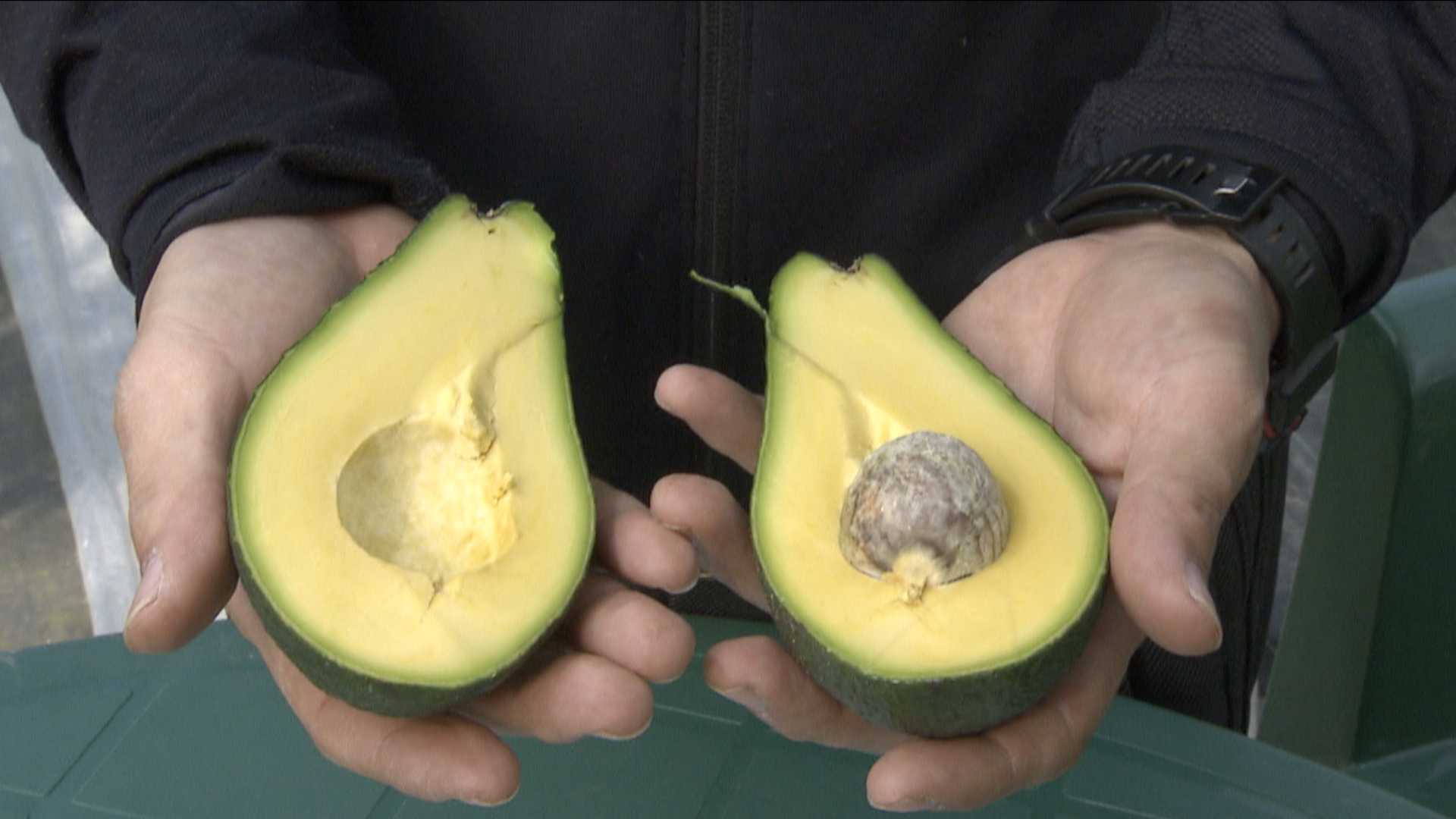
Takeda: Mr. Atsushi, is there anything you think about when you buy avocados? How do you go about finding delicious ones?
Tamura: I touch the outside to find one that has the level of softness that I want to eat. I don't really want to go around touching the things we share with other people at the grocery store though, so I try to do it surreptitiously. [laughs]
But a lot of times I think one is a good softness and buy it, but then when I cut into it there are black lines in it. I don't really like those black lines. I'd like to know how to recognize that.
Yokoyama: That happens when they are refrigerated while they are ripening. At the grocery store, are they sold in refrigerators or cold areas? Really, avocados are supposed to be stored at a temperature of around 20°C.
I think you probably learned about it in junior high school, but the fibrovascular bundles lignify, which turns the fibers black.
Tamura: Fibrovascular bundles? Did we learn about fibrovascular bundles in junior high? [laughs]
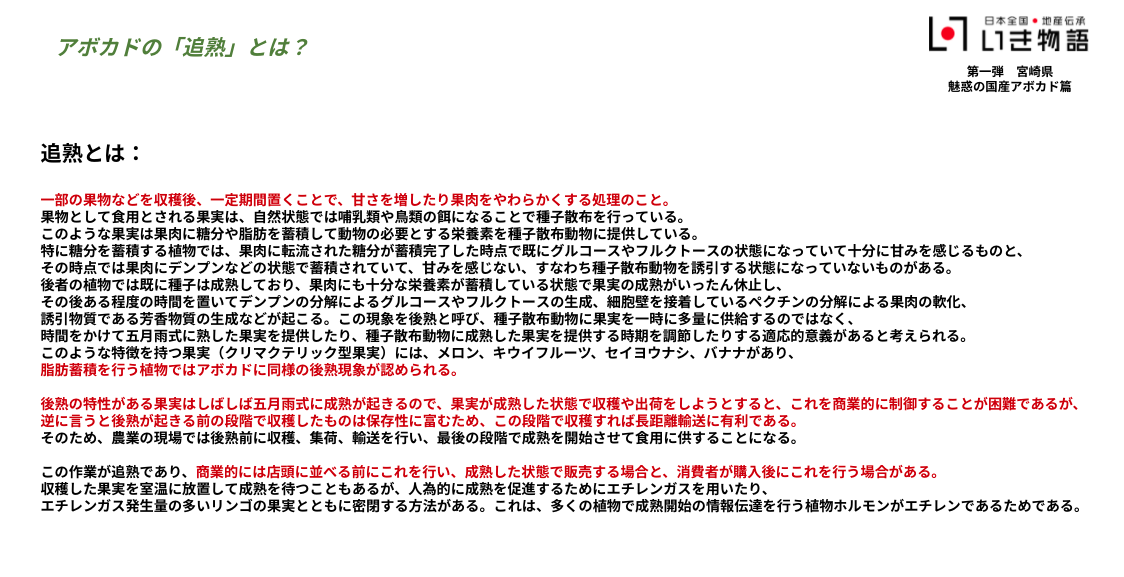
●How Can We Identify Delicious Avocados?
Takeda: You were talking about ripening earlier, but avocados are more delicious if they are ripened after harvesting, correct?
Yokoyama: Avocados cannot be eaten if they aren't ripened. The pulp of fruit is starch, and when that starch turns into sugar is when it can be eaten. That's why avocados can't be eaten if they aren't ripened. If the ripening process doesn't occur at around 20°C, those black lines will show up. So my recommendation is to buy green avocados and let them ripen at home. If you do that, you'll be able to eat delicious avocados.
Tamura: Ripening them yourself is also something fun about avocados. When you think they're about ready and cut them open, they won't have those lines if they were kept at around 20°C. Just hearing this makes coming here today worth it. I wonder why people at the grocery store don't tell us that.
Takeda: About how long does it take for avocados to ripen?
Yokoyama: For the early varieties it takes about 10 months or so, but for the longer ones it takes about a month.
Tamura: I can't wait a whole month. But that's part of avocados, isn't it?
Tamura: If you think about it from the time you buy them at the grocery store, about how long should you let them ripen for?
Yokoyama: That depends on the color. If they're still green, you can leave them in a warm room and you'll be able to eat them in about 10 days or so.
Tamura: If you touch it and it's soft, does that mean it's ok to eat?
Yokoyama: Imported avocados are a variety with tough skin, so if they're even a little soft they should be ok to eat. The ones we cultivate here (at Yokoyama Fruit Farm) stay green even after ripening, so if you don't touch them, you won't know (when they can be eaten).
Takeda: Is there a way to choose them by appearance?
Yokoyama: Delicious avocados are usually short, stout, and round. Tapered avocados are good too, but short, round ones are usually the best.
Tamura: Ones shaped like mangoes?
Yokoyama: That's exactly the shape I like the best.
Tamura: That's amazing. In the end, we arrived back at mangoes. The most delicious avocados are shaped like mangoes.
Takeda: I had never thought to taste and compare different varieties of avocados. Now, a lot of customers end up trying out several different varieties though, don't they?
Hattori: Yes. There are a lot of big enthusiasts among the people who buy Mr. Yokoyama's avocados, and repeat customers often order different varieties. Conversely, there are also some people who inquire as to whether we have certain varieties.
Tamura: When manufacturers like Mr. Yokoyama express love for their mangoes and believe that their products are truly delicious, doesn't that make it easier for you to distribute them too, Mr. Hattori?
Hattori: The manufacturers are particular about their products, so they aren't sold just anywhere. That sort of thing is really easy to sell on the internet.
Tamura: I see. Things that are difficult to get can be found online. That means we can connect with the allure of local regions. But, I suppose if no one talks about it, then we won't know. Even if I passed Mr. Yokoyama on the street, I wouldn't be able to tell that he grows mangoes or avocados. [laughs]
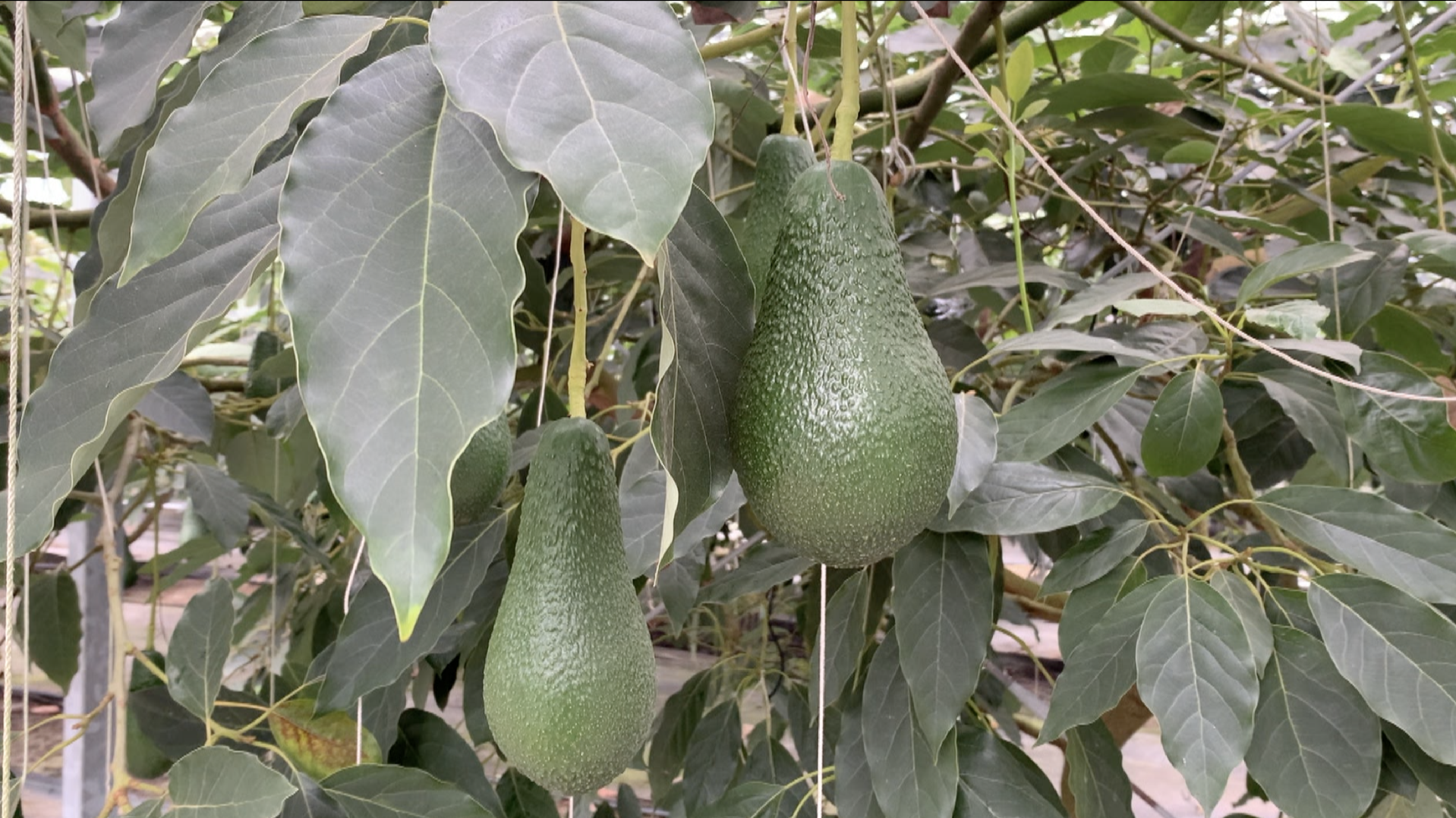
Takeda: Mr. Yokoyama, you started cultivating these avocados after you discovered how delicious they are. What was the deciding factor?
Yokoyama: The first time I ate an avocado that I had grown was one that I had grown inside the mango greenhouse. Avocados are called the "butter of the forest," but when I eat imported ones, they don't really seem like butter.
But after growing some myself, I started to think that they go beyond butter, closer to cheese. It made me want to spread it on bread without adding anything else. I had grown that sort of avocado, and so I thought I could make it work.
Tamura: I see. Then you called Mr. Hattori right away, told him that you'd grown something great. [laughs] Mr. Hattori, when did you eat them?
Hattori: I didn't get to try them in the first year. The second year, I received maybe two? But it was still just two, so I couldn't do business with them yet. It took about two years after that, and finally this year they told me they have about 50 to sell.
Tamura: When did you first taste them yourself?
Hattori: The first time was in the second year. I didn't get to try them the first year.
Tamura: What did you think the first time you ate them?
Hattori: I had only ever eaten avocados from other countries, so I thought that the richness and feel of these was completely different.
Tamura: Also, the color is beautiful. Even if you dig out the middle, it still looks really nice.
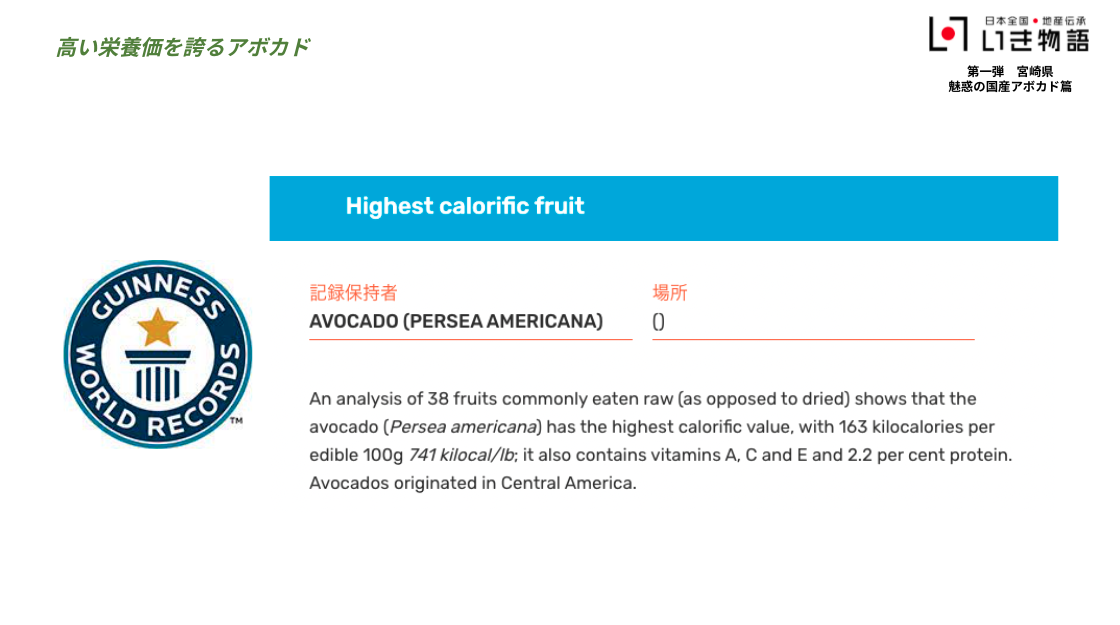
Takeda: Also, avocados are called the butter of the forest, or the cheese of the forest, and their nutritional value is really high.
Yokoyama: Yes, that's right. Actually, avocados are listed in the Guinness Book of World Records. They're listed as the fruit with the highest nutritional value in the world.
Tamura: What kind of nutritional value do they have?
Yokoyama: Avocados are made up mostly of unsaturated fatty acids. Within those unsaturated fatty acids, there is a high amount of something called oleic acid, which will attack just cholesterol, the bad bacteria, while leaving the good bacteria alone. They are mostly made up of those kinds of fats, but there is also calcium, magnesium, iron, and most minerals in them too.
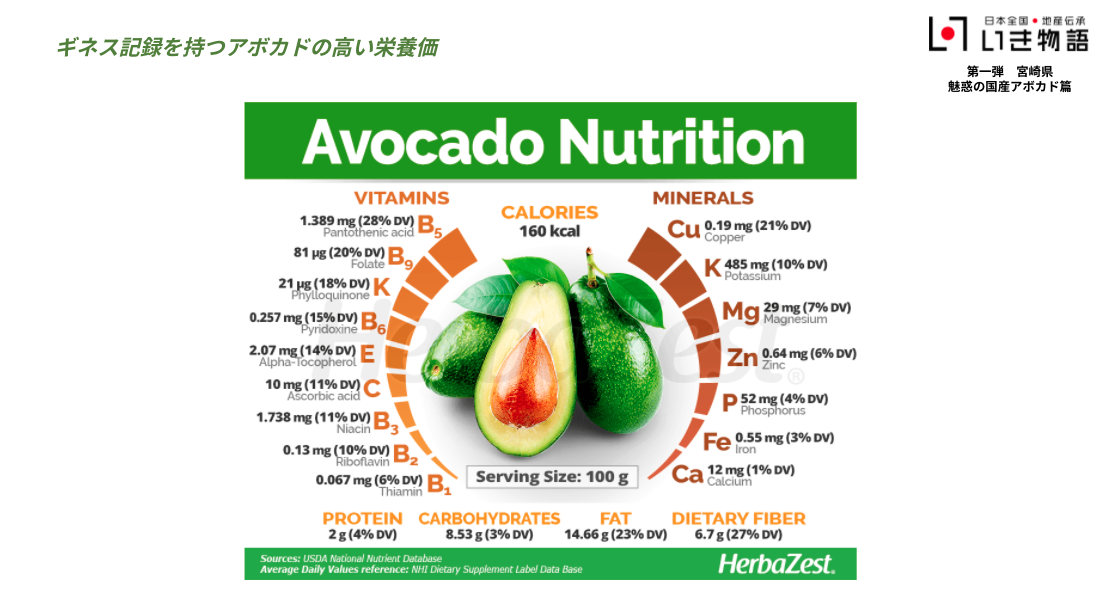
Tamura: So, rather than getting your nutrients in the form of tablets, eating avocados will supply you with plenty of nutrients.
Yokoyama: Yes, that's precisely it. Since they're made of unsaturated fatty acids, you could even say that you should eat them.
Tamura: They surpass mangoes in terms of nutritional value, right? Mangoes are sweeter and very delicious, but if you think about both taste and nutritional value, it's easy to think that avocados are better.
Takeda: How much future potential do you think domestic avocados have?
Hattori: More than 99% of them are imported, and domestic avocados make up less than 1%, I think it's around 0.01%. It doesn't even come close to 1%.
Tamura: Not even 1%. It's around 0.01%?
Hattori: Yes. There probably aren't even 10 tons.
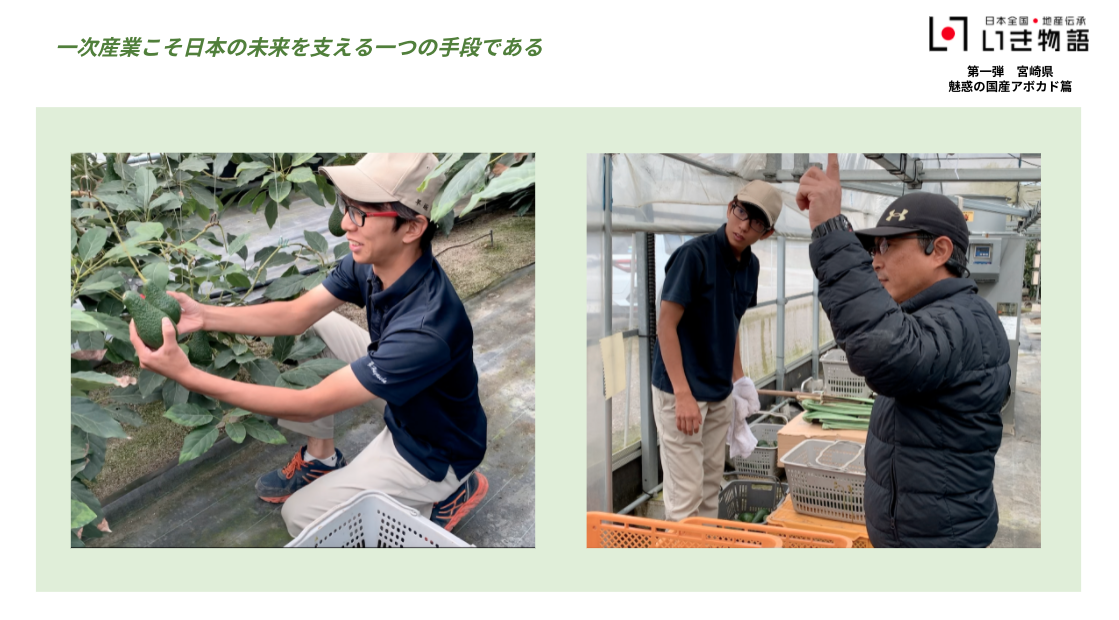
●The Future Possibilities for Avocado Cultivation
Takeda: What do you think about the possibility of domestic avocados increasing in the future?
Hattori: Mr. Yokoyama is diligently establishing the cultivation methods, and I intend to increase the number of manufacturers. By doing that, of course we'll be able to increase domestic distribution, but I think there is promise in aiming for international exports in the future, too.
Tamura: If products of this quality were on the shelves at grocery stores, I'm sorry but they're on a completely different level from avocados from abroad, so not just domestically, but couldn't this become a fruit that goes out into the world from Miyazaki?
Hattori: Yes, I think so. Domestically speaking, it's a market scale of 30 billion yen, but globally it's about 40 billion U.S. dollars. That's about 100 times more.
Tamura: How much is that in Japanese yen?
Hattori: It's about 4 trillion yen. Globally, the popularity of avocados is increasing.
Tamura: Mr. Yokoyama, you'll have to make a lot of apprentices.
Yokoyama: I really will. There's an agriculture junior college in Miyazaki, and every year some students come in for apprenticeships; their eyes light up when they work on avocado cultivation.
Tamura: Is this something that can only be done in Miyazaki? Or, if you have a greenhouse, could you cultivate them in different regions?
Yokoyama: Yes, of course. There are people who are cultivating them in places other than Miyazaki, and it's developing all over the country.
Tamura: I'd like to try it. It really feels like there are a lot of possibilities, doesn't it? It's still a fresh fight with few opponents; there aren't any other people cultivating. Because so far, there is only one person on earth growing quality avocados, and that is Mr. Yokoyama in Miyazaki.
The people in Mexico might say, "Damn it! Someone in Japan is growing super delicious avocados!" but what I'm saying is that it's just a matter of doing your best over there. In the avocado industry, these avocados are the ones causing a stir. This deliciousness.
Takeda: Mr. Yokoyama, you're also making a textbook on domestic avocados. It seems to be very popular with students and other people who want to try something new themselves, or who want to try something they don't yet have the know-how for. I would guess there will be more young people in the future.
Yokoyama: Yes. The number of people who cultivate fruit is decreasing. It's a difficult situation, but there are a lot of young people who want to work with something new like this. In order to pull those kinds of young people into the world of agriculture, I think it's important to establish the techniques for avocados.
Tamura: Mr. Yokoyama and Mr. Hattori, from your viewpoints, do you have strong feelings about the kinds of things that have been created in Miyazaki Prefecture or the things you'd like to send out from Miyazaki Prefecture?
Yokoyama: Yes, Miyazaki Prefecture is at a geographic disadvantage, so even if we make good products, they often don't make it out into the world. Through the combined efforts of myself and Mr. Hattori, we hope to spread these things to other places.
Tamura: Mr. Hattori, how do you feel about the perspective of sending out the good points of Miyazaki? What are your thoughts?
Hattori: The manufacturers are producing things as best as they can, and they make good products, but in regards to sending them out, there isn't really a logical manner in which time and effort can be spent on reliable delivery. I want to lend my support in the shipping areas of sending out the products.
Tamura: I knew that mangoes were famous, but if people learn that Miyazaki Prefecture has avocados too, its allure will rise considerably. When I actually go to Miyazaki for sightseeing, mangoes are good too, but I could go to an avocado farm for fresh-picked avocados… but fresh-picked avocados need to be ripened. [laughs] Mr. Yokoyama, if I went to your farm, would there be some that have already been ripened?
Yokoyama: There aren't that many now, but we have a system in which if you contact us ahead of time we can harvest them.
Tamura: I see, ripening starts after harvesting.
Yokoyama: Yes, it does.
Tamura: First, I want everyone to know that that's the way to enjoy them. If people understand that avocados are best enjoyed after ripening, I think everyone will commit to them. I think that I, too, will buy harder ones next time, because I want to ripen them myself. [laughs]
Takeda: It's profound, isn't it?
Tamura: Yes, it's profound.
Takeda: Now, there is no particular path ahead of domestic avocados, so the possibilities are infinite, or rather, wide open. I'm excited for what's coming. Well then, Mr. Yokoyama, would you mind telling the listeners again about your love for avocados?
Yokoyama: I'm still a mango farmer, really. I can't confidently say that I'm an avocado farmer, because the techniques for avocado have not yet been established. My dream for the future is to become an avocado farmer who has the kind of environment that makes it possible to raise my children with avocados alone.
Takeda: Thank you so much. Mr. Atsushi, what did you think of the first Ikimonogatari event?
Tamura: I do really feel like I want to visit. Ms. Takeda, you're there now, breathing in the air, seeing Mr. Yokoyama's face and expressions, hearing Mr. Hattori's voice and expressions in person, right?
I, too, would like to share my feelings about those things that you're experiencing, the things Mr. Yokoyama endorses as a manufacturer and the things Mr. Hattori endorses. After all, when participating remotely like this, we can only feel things through the screen. So from next time, if possible, I'd like to hold an Ikimonogatari event at a distance that conveys the manufacturer's true warmth.
But even so, having some of these avocados right at my fingertips is really amazing. I could taste and feel the conviction, and even though the story is so interesting, it's not really known in local regions yet, and we didn't know about it either. Not until we got the information from those two.
So, even just a little, I'd like to use my job as an influencer to convey it to many more people. If a lot of people know about the allures of these avocados, it would help Mr. Yokoyama be able to say unreservedly that he runs an avocado farm.
It's something that would support Miyazaki, and it would also support Japan. Everything is connected. People tend to separate local regions and urban centers, but they're actually linked. I really felt strongly during this first event that if everyone works together, we can move in a direction to revitalize Japan. I'm really grateful for Mr. Yokoyama and Mr. Hattori. Thank you so much for creating and distributing such wonderful things.
Sponsored Links
Unmissable Tours
Expand your horizons by interacting with diversity. Take a look at guided tours on which you can connect personally with the guides and have truly extraordinary experiences.
Search
